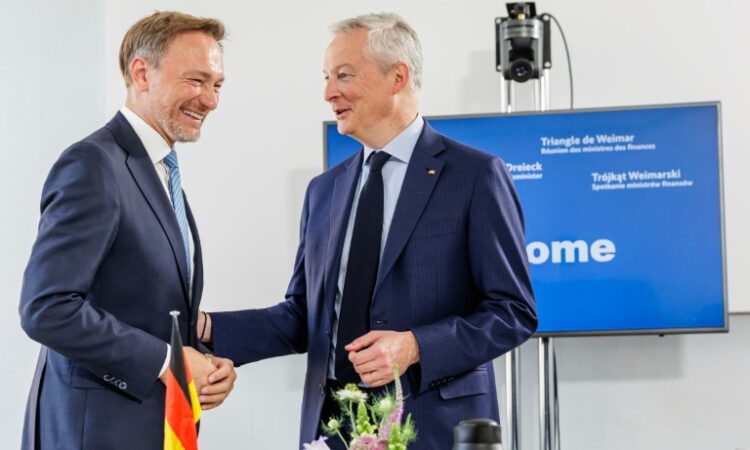
The EU agreed reforms Wednesday that will loosen budget rules to encourage investment while keeping debt and spending under control, after France and Germany bridged their differences.
Finance ministers from the 27 members met by video link to hammer out the agreement — after their French and German colleagues got together in Paris on Tuesday to clear the way for a compromise.
France’s finance minister Bruno Le Maire hailed the deal. “Historic accord! After two years of intense negotiations we have new European budget rules,” he said on social media.
Dutch minister Sigrid Kaag said the agreement would “encourage reforms, with room for investments and tailored to the specific situation of the member state in question”.
Advertisement – Scroll to Continue
She said “they work counter-cyclically so that potential economic growth is not cut short”, adding that the rules would be better adhered to than in the past.
The fiscal straitjacket imposed on EU members — limiting countries’ debt to 60 percent of GDP and public deficits to 3 percent — was loosened during the Covid pandemic to allow greater state spending.
Originally, this was meant to be temporary.
Advertisement – Scroll to Continue
But it launched a two-year debate between countries led by Germany that wanted a return to rigorous controls, and others led by France that wanted more flexibility.
The latter wanted to allow spending to finance, for example, the transition to green energy or arms deliveries to Ukraine.
While the compromise deal reconfirms the three-percent deficit target, it softens the rules for how quickly and a severely a country has to cut spending to get back within the parameters.
Advertisement – Scroll to Continue
“It was a hard road,” Spanish finance minister Nadia Calvino, whose country holds the EU presidency, said after the video conference.
“t was a difficult path to tread. And now we have finally reached safe harbour at a historic moment,” she added.
“The rules are more realistic. They respond to the post-pandemic reality and they incorporate also the lessons learned from the great financial crisis.”
Advertisement – Scroll to Continue
Italy’s Minister of Ecoomy and Finance Giancarlo Giorgetti hailed a “realistic” deal borne from “a spirit of inevitable compromise”.
Time had been running out for a deal.
If no new plan had been agreed the original stability pact would have come back into force on January 1. Failure to agree new rules would also have damaged the EU’s credibility on the markets.
Advertisement – Scroll to Continue
Unions and environmental groups lobbying for more green investment were disappointed, however.
The European Trade Union Confederation called it “self-sabotage” that would hurt workers.
“This is still a fundamentally bad proposal that would push the European economy even further towards another recession,” ETUC General Secretary Esther Lynch said.
Greenpeace accused EU finance ministers of “irresponsibly cutting Europe’s ability to pay for the green transition.
“EU governments want to usher in austerity for people and nature without challenging the billions in public money subsidising fossil fuels, or taxing the richest in our societies,” it said.
Now that there is political agreement, the EU member states will seek endorsement from the European Parliament to pass binding legislation before European elections in June.
The draft text provides for rules more adapted to the particular situation of each country, allowing big spenders a slower route back to frugality.
Brussels is proposing member states present their own adjustment trajectory over a period of at least four years to ensure the sustainability of their debt.
Reform and investment efforts would be rewarded by the possibility of extending this budgetary adjustment period to seven years to make it less brutal.
The targets would be linked to evolution of expenditure, an indicator some consider more relevant than deficits, which can fluctuate according to the level of growth.
In order to satisfy Germany, any country with an excessive deficit will be forced to make a minimum effort to reduce it, which could be 0.5 percentage points per year.
Paris, however, won from Berlin a suspension of this clause between 2025 and 2027, during which the increase in the cost of debt linked to high interest rates will be taken into account
Berlin also wants a public deficit target of 1.5 percent of GDP assigned to the most indebted countries, to preserve a safety margin in relation to the three-percent ceiling.
To achieve that, an adjustment of at least 0.4 points of GDP per year will be required, which can be reduced to 0.25 points in the event of reforms and investments.
The debt will have to fall by one percentage point per year on average over four or up to seven years.






